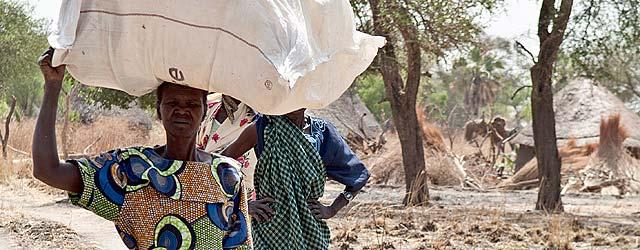Treating the Symptoms and Causes

The LWF is helping those like this woman who lost home and belongings in the recent attacks to get back on their feet. © LWF/Melany Markham
LWF Meets Immediate Needs while Addressing Causes of Poverty in South Sudan
There is a general rule that a person can live for three minutes without air, three days without water and three weeks without food. In disasters where people have lost everything, this rule of “three” governs emergency relief priorities.
Non-food items (NFIs) such as blankets, sleeping mats, jerry cans, soap and cooking utensils won’t sustain life, but they will help families get back on their feet after losing everything. The Lutheran World Federation (LWF), a founding member of the ACT Alliance, has been distributing NFI kits after the recent wave of violence in Jonglei State, South Sudan.
There is a lot that can go wrong when these supplies are being transported from point A to point B. Potholed roads, cumbersome bureaucracy and inclement weather can all slow down or stop aid consignments.
In the heat of a hot Sudanese day, LWF staff sit discussing what to do about a truck that is several hours late. It was supposed to arrive at the compound for another load of NFI kits before distribution the following day.
“If we keep waiting for it, the kits won’t get there tomorrow,” says Manyok Ajangdit, a program officer who is based in Panyagor, Jonglei State.
Ajangdit was from the town where the distribution is happening, so he knows the area and the people well. Most of the staff based in Panyagor come from the surrounding area and are constantly gathering information about everything–from the state of the roads to the level of security.
Late in the afternoon, Ajangdit and his colleague John decide to go into town and look for another truck to transport the remaining consignment to the distribution point in Duk Padiet. If all of the kits are not there, the distribution may have to be delayed and people would have to wait another day for desperately needed supplies.
The Most Needy
When large numbers of desperate people gather during disasters, unfair aid distributions can cause riots or stampedes. Local authorities are essential in finding the people who need aid the most, but need to be well organized to make sure that it gets to these people.
The next morning, the staff is up before dawn for the three-hour drive to Duk Padiet. It is too dangerous to drive in the dark, so they leave just as the sun is rising. Breakfast is on the road–a cup of tea and fried bread. They reach Duk Padiet around 10 a.m. and find that the kits, which were kept in a guarded warehouse overnight, are all there. Once they are counted, the distribution can go ahead.
Everyone sits under the shade of a huge tree while officials call out names. Individuals then collect their kit from the warehouse and place a fingerprint next to their name by way of receipt. At around 2 p.m., most of the people have received their kits. As staff needs to get back to the compound by nightfall, they aim to be on the road again by 3 p.m.
It’s at least 40° C and, even though the staff are used to the heat, everyone drinks a lot of water on the drive back. They drive back with the windows down, but the hot wind brings little relief.
When they finally reach the compound at around 5 p.m. there is a feeling of satisfaction and relief among the staff. It’s been a ten-hour day already, but the work isn’t finished. They need to check in with the headquarters in Juba, compile reports, answer e-mails and administer ongoing development projects before the day officially ends.
Symbol of Wealth
Ultimately, the cause of this emergency is the same that fuels violence and conflicts in many parts of the world, namely poverty and inequality. Cattle raids, during which homes were burnt, people killed and children abducted, have been occurring since December last year.
Mary Obara is from neighboring Kenya but has worked in South Sudan for three years. As the LWF’s program coordinator, she is familiar with Sudanese cattle culture, which she says is hard to change.
She notes that cattle are a symbol of wealth in South Sudan and attributes the current conflict to a lack of basic services. “Changing the cattle culture goes hand-in-hand with overall development,” she emphasizes.
This is the main reason why the LWF has had education, food security and water programs in South Sudan for a number of years–to bring development to impoverished rural communities where cattle-raiding is rife. To provide the people in Jonglei with alternatives to cattle herding, the LWF will begin large-scale agricultural projects this year.
Although cultural change happens slowly, it is possible. Pastorialism used to be prevalent throughout the country. Olaa Augstin is from Eastern Equitorial, bordering Uganda, and his grandfather used to herd cattle. He says that violence caused them to give it up. Both he and his father pursued an education and have worked for a number of years in Juba.
Violence is not the only reason for South Sudanese to switch from cattle herding to other forms of agriculture. Diseases such as foot and mouth kill cattle in large numbers and Obara says that if the climate changes drastically, the farmers will lose a lot of their herds.
The conflict that has caused the most recent emergency has ancient causes that will not be resolved by any amount of emergency aid. In the long-term, however, LWF programs help to provide those living in Jonglei and other states with a way out of poverty and a different way of life.
(946 words) (Written for LWI by Melany Markham in Juba, South Sudan)

